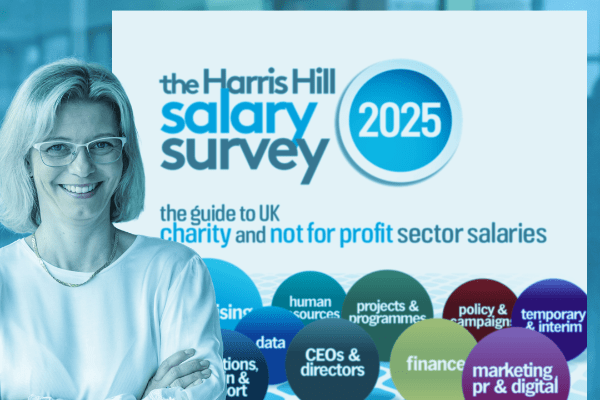2017 Salary Survey - what's happening in Fundraising?
Here's the view from our fundraising specialists...
For the fundraising salary figures, view or download the full 16-page survey here
Given the fundraising landscape of the past few years has been shifting, changing and developing new features at a rate that would put your average teenager to shame, it's perhaps surprising how little has changed in terms of salary trends over the past 12 months.
Following significant scrutiny, criticism and review of fundraising practices during 2015-16, the newly-established Fundraising Regulator is well underway towards launching the Fundraising Preference Service (FPS), aimed at giving the public greater control over the type and frequency of donation requests they receive. As the direct impact will be on direct marketing methods, many organisations have continued aiming to expand and strengthen their other income streams, innovating and diversifying, expecting the revenue generated from direct marketing to fall, at least in the short term. But will it?
Appropriately enough for a group of people unafraid to head into uncharted waters, the RNLI pioneered a project which aimed to take an 'opt in' approach to 100% of their fundraising by the end of 2016. And while it wasn't entirely plain sailing (sorry...) the theory that better results could be achieved from a smaller audience who had actively chosen to receive communications than a larger audience who hadn't - certainly proved to hold water (sorry again...) for them, signing up over 450,000 donors, far in excess of the 255,000 that were predicted to do so.
Which isn't to say that this will automatically be the right approach for every cause and every charity, and since even temporary falls in income, along with the cuts being experienced by many organisations reliant on government funding, could have significant consequences for some charities and their beneficiaries, there could still be stormy seas ahead (last nautical pun, we promise) over the coming year.
So what does all this mean for fundraising salaries?
Well, the good news is that we haven't identified any areas where we've found that salaries for fundraisers are falling or even entirely static. The overall trend we're observing continues to be upwards, albeit within a range of increases that runs from 'modest' down to 'almost imperceptible', depending on the income stream.
It's a continuation of most of the trends that were already underway in 2015-16, with organisations aiming to expand their activities in areas with the greatest potential for growth, or those where innovative methods of generating income can best be developed
The most noticeable salary increases have been in major donor fundraising, and when a single donation or regular commitment from a wealthy donor can sometimes outweigh hundreds of others, it's understandably an important focus for many charities. But it's also an area requiring specific qualities, skills and experience that are in very short supply. As a result, those with a strong record of forging fruitful relationships with major donors have no shortage of options, leading charities to increase their offers in a bid to secure these elusive candidates. However, following recent controversy over research practices and sharing of information on wealthy donors, some organisations may begin to adopt a more cautious approach to this area, which could translate into slightly fewer vacancies.
Demand for talent is also outpacing supply in the world of events - perhaps not surprising when leading events portal Eventbrite recently reported that the number of charity events taking place in the UK each year has risen by a phenomenal 700% since 2007.
Some of that may be linked to the rise of social media over the same period, making it significantly easier to publicise events and recruit/engage with participants (we suspect a certain TV baking show may have boosted the numbers too...), and the Institute of Fundraising's most recent research showed that a majority of charities were seeing income from events increasing, often quite substantially.
But it also showed that a majority, though keen to do so, lacked the resources to expand their teams, so there hasn't been a corresponding increase in charity events professionals. Which inevitably means increased competition for existing candidates and upward pressure on salaries.
Experienced candidates in legacies, trusts and statutory fundraising are also in high demand but short supply, and many organisations are keen to generate more from these income streams, recognising their often untapped potential to compensate for possible losses elsewhere.
To an extent the same could be said of both corporate and community fundraising, and what's common to all of these areas is that salary increases have been much more noticeable within smaller charities than at the larger end of the scale, where there's relatively little movement.
This might be explained by the biggest organisations tending to have long-established teams and programmes in place already, resulting in more settled salary levels, while smaller charities looking to grow these teams will often need to raise their offers in order to attract talent away from this limited candidate pool.
With the Fundraising Preference Service principally affecting direct marketing fundraisers, most will need to devote significant time and resource over the coming year to ensure compliance with new guidelines and best practice. Whether using traditional or digital fundraising methods, making sure that donors receive only their preferred type and frequency of communications is likely to pose significant challenges, and uncertainty over the impact on revenue may have contributed to salaries in this area having shown little movement over the past 12 months.
But whether it's a result of new regulation, or driven by technology allowing smarter use of supporter data, as a team we're seeing a sector-wide shift towards more tailored, relationship-based fundraising, nurturing existing donors and responding to their preferences, rather than a mass-targeting, one-size-fits-all approach. Those who can best adapt and thrive in this environment are the fundraisers we believe are most likely to see further increases over the year or two ahead.
Good news for many if you're looking for a new role then, but what if you're looking to hire?
With a shortage of candidates in most areas, limited budget, and pressure (not least from the media) to keep a tight rein on salaries, how can organisations secure the staff they need?
Our advice remains simple: make the application and interview processes as swift and efficient as possible, consider motivated candidates from outside the sector with the right transferable skills (there's definitely no shortage!), be as flexible and innovative as you can on hours, benefits, terms & conditions (to compensate for salary limitations) and above all, ensure that line management and HR collaborate closely and agree a clear brief for the role, so that a decisive offer can be made almost immediately once that ideal candidate is found, before they're snapped up elsewhere.
If you'd like any more information on fundraising salaries, please call our Fundraising Team on 020 7820 7306 or email fundraising@harrishill.co.uk
Meanwhile for the complete figures for fundraising and all other major charity job functions, view or download the full survey here.
-

Opportunity for all
Find out how we’re working to deliver more diverse, equitable and inclusive recruitment…
-

Recruiting a charity CEO?
Our executive recruitment specialists have an exceptional record of successful CEO, chair, trustee and…
-

Charity sector salaries
Our 2025 Salary Survey has the latest rates and expert insight for roles throughout the sector.













